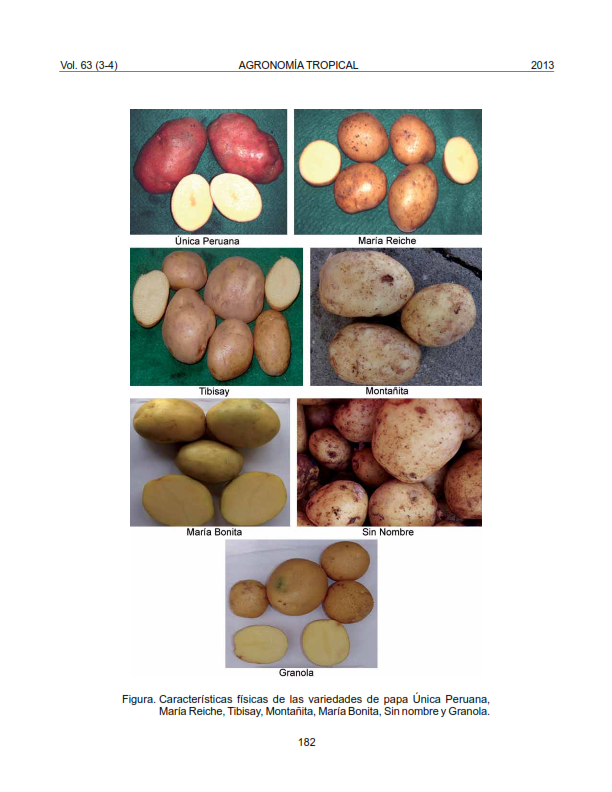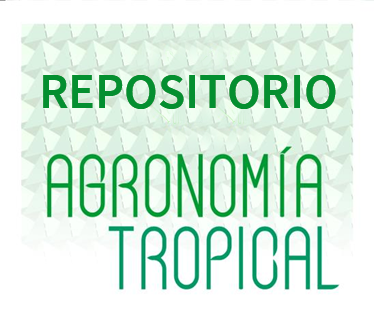Growth and yield of potato varieties in Cuencas, urdaneta township of Trujillo state, Venezuela
Abstract
Potato production (Solanum tuberosum L.) is part of the culture and way of life of Andean horticulturists. It is a strategic crop for being a source of carbohydrates, proteins, and vitamins. Potato has versatile forms of consumption and wide adaptability to different agro-ecological conditions. To evaluate local varieties Montañita and Sin Nombre from Táchira state, and commercial varieties Tibisay, Maria Bonita, Única peruana, Granola and Maria Reiche, a trial was conducted in Cuencas, Urdaneta township, Trujillo state, Venezuela; 1,627 meters above sea level, relative humidity 80-90% and temperature 14-16 °C, with an experimental design in random blocks with 4 replications; 4 rows per 3 m length plots and 10 tubers per row, planted at 0.80 x 0.30 m. The evaluation was performed by methodology proposed by International Potato Center (CIP). The highest percentages of emergency were found in Única peruana (97.50%), María Reiche (91%) and Tibisay (90%). Sin nombre, María Reiche and Tibisay achieved the greatest heights; while Sin nombre the highest number of stems and tubers. Best yields were achieved in Montañita (19,246.43 kg h-1) and Única peruana; (17,413.32 kg h-1) and the lowest yield was obtained by María Bonita variety (10,276.19 kg h-1). Única peruana and María Reiche produced the highest percentage of potatoes for consumption and were suitable for industrial processing in the production of sticks. Other varieties can be used for flakes production.
Downloads
References
• FAO. 2012. Organización de las Naciones Unidas para la Alimentación y la Agricultura. Estadísticas de producción. FAOSTAT. Disponible en línea: https://bit.ly/2wZfbUu [Jul. 20, 2012].
• Infostat 2004. Versión 1,1 Manual del usuario. Grupo Infostat, FCA, Universidad Nacional de Córdoba. Editorial Brujas. Argentina. 318 p.
• Meza N. y A. Valera. 2008. Caracterización de parámetros poscosechas de nueve materiales de papa (Solanum tuberosum L.) cultivados en la localidad de Cuencas, Trujillo, Venezuela. Proc. Interamer. Soc. Trop. Hort. 52:55-57.
• Meza N., J. Herrera y S. Gudiño. 2009. Comportamiento de clones promisorios de papa (Solanum tuberosum L.) en la localidad de cuencas estado Trujillo, Venezuela. Bioagro. 21(2):149-151.
• Pérez de Camacaro M., M. Ojeda y D. Rodríguez. 2006. Evaluación de la calidad de nuevas papas (Solanum tuberosum) cosechadas en la localidad de Sanare, estado Lara, Venezuela. Proc Interamer. Soc. Trop. Hort. 50:46-53.
• Porras E. y M. Gallardo 2011. Caracterización agronómica de materiales genéticos de papa (Solanum tuberosum L.), en la localidad la loma de Cubiro en el estado Lara, Venezuela. Agronomía Trop. 61(2):105-111.
• Streck N. A., F. L. Matielo de Paula, D. A. Bisognin, A. B. Heldwein and J. Dellai. 2006. Simulating the development of field-grown potato (Solanum tuberosum L.). Agricultural and Forest Meteorology. 142:1-11.
• Zosimo H. 1994. Potato descriptor for a minimum characterization of potato collection. Publicación del Centro Internacional de la papa (CIP). Lima. pp. 40-48.





